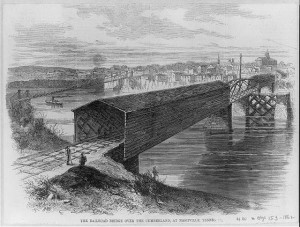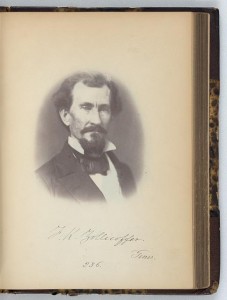From The New-York TimesFrom The New-York Times January 12, 1862:
THE DEFENCES OF COLUMBUS.
Correspondence of the Cincinnati Commercial.
LOUSVILLE, Tuesday, Jan. 7, 1861.
The Catholic Bishop of Nashville has arrived here.
He states that drafting in Tennessee proved a partial failure. Union men are numerous in that city. They are not outspoken, but often indulge in ridicule of the Confederate Government, and use language which indicates their feeling. The rebel army is a greater terror, even to Secessionists, than the Union army. If Bowling Green falls, Nashville will be destroyed. Forts are being built near the city, one is situated two miles north of the city on the Gallatin turnpike, and others east and west of the city.
The Bishop came by way of Bowling Green and Munfordsville. He knows nothing of the force at Bowling Green. No reinforcements had arrived from Columbus. He saw at Glasgow Junction the remains of the splendid tunnel at that point, destroyed on the 5th by rebels. The railroad from that point north has been entirely destroyed — even rails taken away. The turnpike has been obstructed by felled trees. The rebels are endeavoring to draw Union men on Bowling Green. He says the approach to Columbus, Kentucky, is splendidly defended by numerous batteries, chains and torpedoes obstructing the river, and thinks it an utter impossibility for gunboats to live in the water at that point. Gen. ZOLLICOFFER has thrown three regiments of rebels in Jimtown, to keep the rear open and to guard.
Born in Kilkenny, Ireland, James Whelan became the second Catholic Bishop of Nashville in 1860.
As a border state, Tennessee was the scene of some of the most severe battles during the Civil War (1861–1865). While passing through the lines after a visit with Bishop Martin John Spalding at Louisville, Whelan was accused of making remarks within Union lines which the Confederates thought had influenced the movements of the Union Army. These reproaches, combined with the sufferings, struggles, and sorrows of war, proved too much for Whelan, who resigned as Bishop on February 12, 1864; he was immediately named Titular Bishop of Diocletianopolis in Palaestina.
As The National cyclopaedia of American biography, Volume 12 says, Bishop Whelan was a southern sympathizer. This source basically backs up the Wikipedia article, although it has Whelan resigning in 1863.
It is said that in early January 1862 Felix Zollicoffer had his troops positioned at Mill Springs, Kentucky.


